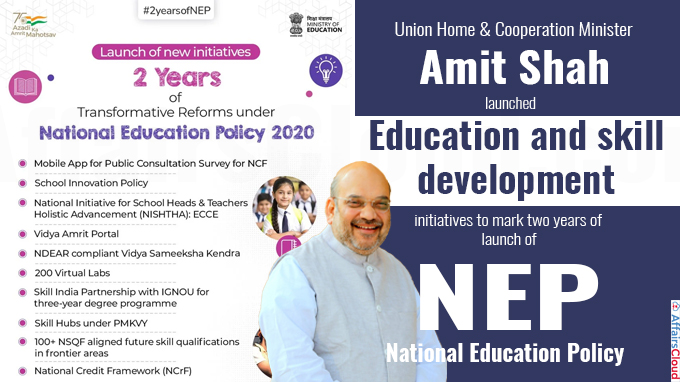
On July 29, 2022, Union Home & Cooperation Minister Amit Shah launched a number of new initiatives in the domains of education and skill development to commemorate the completion of two years since the National Education Policy 2020 (NEP 2020) was introduced on July 29, 2020.
- The initiatives that were established cover every aspect in education and skill development, including teacher training and assessment, digital education, innovation, and synergising education and skill development.
Dignitaries
The event was attended by Dharmendra Pradhan, Union Minister, Ministry of Education & Ministry of Skill Development and Entrepreneurship; Subhas Sarkar, Union Minister of State (MoS) for Education; Annpurna Devi, Union MoS for Education and Rajeev Chandrasekhar, MoS for Skill Development and Entrepreneurship. Anita Karwal, Secretary of School Education, gave the welcoming speech, while K. Sanjay Murthy, Secretary of Higher Education, gave the vote of thanks.
Some of the Essential Aspects of NEP 2020
i. The NEP 2020 aims to promote holistic human development while paying attention to attitudes toward education, science, and culture. It serves as a counterbalance to the Macaulay educational systemwhich was introduced in India in 1835.
ii.The 5 primary pillars of NEP 2022: Enhancement of Capacity, Accessibility, Quality, Fairness and Accountability.
iii. A target has been set in this education policy to give vocational education to at least 50% of students in the school and higher education systems by 2025.
iv.This policy prioritizes Indian languages, art, and culture, and the Government of India (GoI) has set a goal to establish a Multidisciplinary Education and Research University (MERU) in each district or between two districts by 2030.
Click here to read more about the Highlights of New Education Policy-2020
NOTE:
i. In the establishment of Higher Education Institution, the GoI has built six Central Universities, 7Indian Institutes of Technology (IITs), 7Indian Institutes of Management (IIMs), 16 Indian Institutes of Information Technology (IIITs), 15 All India Institute of Medical Sciences (AIIMS), and 209 Medical Colleges, increasing the overall number of Universities by 302 and the number of colleges by 5700.
ii.As Indian languages are now becoming more significant in higher education,
- The Joint Entrance Examination (JEE) and National Eligibility Cum Entrance Test (NEET) UG (Under Graduate) exams are conducted in 12 Indian languages as well as English.
- The Common University Entrance Test (CUET) has also been conducted in 13 Indian languages.
- Ten states have approved Indian languages in engineering, including Hindi, Tamil, Kannada, Telugu, Marathi, and Bengali.
The following are some of the initiatives that have been launched:
i.Establishment of IKS-MIC program for technology demonstration
- This one-of-a-kind initiative will encourage the development of products and processes based on traditional Indian knowledge systems.
- This initiative, which is a collaboration between the Indian Knowledge Systems (IKS) Division and the Ministry of Education (MoE) Innovation Cell, will seek proposals for the development of prototypes and the demonstration of technologies in the fields of technology, engineering, and science.
- The IKS-MIC Virtual Hub of Innovation would provide support for successful participants in their efforts to launch startups.
Note: Indian Knowledge System (IKS) is an innovative cell under Ministry of Education (MoE) at All India Council for Technical Education (AICTE), New Delhi in Delhi.
ii.Introduce 75 Bharateeya games in schools
- The objective of these initiatives is to promote Bharateeya (Indian) games to children, as many traditional games are less resource-incentive and stimulate creativity, friendship, and connection with culture of Bharata (India).
- Through the Physical Training (PT) teachers, a new Bharateeya game will be introduced to the schools each month. A certificate will be presented to the PT teachers and schools with the best performance.
- The students will also be able to take a quiz and receive certificates on the mygov.in portal simultaneously.
iii. Launch of Kalashala initiative in 750 schools to promote and support local arts
- This initiative aims to teach children about various art forms of India and assist them in learning to appreciate the rich cultural legacy of the nation.
- The IKS Division of the MoE aims to implement the recommendations of NEP 2020 for educational institutions through the IKS Kalashala resident artist programmes.
iv.Partnership with Indira Gandhi Open University (IGNOU) for upward mobility
- Partnership with Indira Gandhi Open University (IGNOU) to aid students in achieving higher education and enhancing their livelihood opportunities- opportunity to join the 3- years degree programme of IGNOU.
- As part of the partnership, 32 National Skill Training Institutes (NSTI), 3,000+ Government Industrial Training Institutes (ITI), 500+ Pradhan Mantri Kaushal Kendras (PMKK), and around 300 Jan Shikshan Sansthan (JSS) will work with IGNOU as Registration Centers, Examination Centers, and Work Centers for practical training. Additionally, 500 IGNOU centres have been announced.
v.Skill Hubs Initiative
- In order to meet local economic and skill development demands, the GoI has launched new initiatives in the field of skill development, such as the “Skill Hubs” initiative under the Pradhan Mantri Kaushal Vikas Yojana (PMKVY).
- Nearly 2000 Skill Hubs have been established under its pilot programme, and more than 1.53 lakh individuals have received training to date.
More than 100 National Skills Qualifications Framework (NSQF) aligned future skill qualifications will be developed in 6 key areas which include:
- Automation in Industries (Manufacturing/Service) and Industry 4.0
- Infrastructure Connectivity (EVs and Drones)
- Electronics Manufacturing & VLSI
- Technology Infrastructure including 5G & Cyber Security
- Digital Emerging Technologies
- Indigenous R&D
These qualifications range from foundational courses to long-term training.
- National Council of Vocational Education and Training (NCVET) has facilitated the development and approval of 216 NSQF aligned future skill qualifications across diverse areas and sectors to cater for future skills.
vi.Setting-up of virtual labs
- To enhance critical thinking skills and to give space for creativity in vocational courses, 750 virtual labs in science and mathematics, as well as 75 skilling e-labs for simulated learning environments, will be established in 2022-23, with 200 currently in place.
- The DIKSHA (Digital Infrastructure for Knowledge Sharing) portal now offers a vertical on Virtual Lab for classes 9 to 12 in the fields of Physics, Chemistry, Mathematics, and Biology.
vii. NDEAR Compliant Vidya Sameeksha Kendra (VSK)
- Key stakeholders can take action to ensure the success of their programmes by using National Digital Education Architecture (NDEAR) compatible VSK, which offers an institutional platform for integrated and shared “seeing” and data-based decision making.
viii. Vidya Amrit Portal
- It is a Digital Project that is developed to scale up the micro-improvements being made in school education across India.
- These micro-improvements will be accessible to leaders at all levels through the National Infrastructure for Education-DIKSHA. It aligns to ‘Learn-Do-Practice’ of NDEAR.
viii.National Initiative for School Heads and Teachers Holistic Advancement (NISHTHA): ECCE
- Objective: To prepare an initial cadre of high quality Early Childhood Care and Education (ECCE) Teachers in Anganwadis.
- Expected Benefits: Sensitization of master trainers on developmentally appropriate pedagogy for holistic development of children which will contribute towards enhancing quality education at Foundational level.
ix.School Innovation Policy
The National Innovation and Entrepreneurship Promotion Policy advises school education systems on various measures that may be adapted to foster a learning environment in which students of all ages can develop their creativity, ideation, innovation, problem-solving, and entrepreneurship skills.
x.Public Consultation Survey for NCF
Objective: To conduct a Public Consultation survey in 23 languages to seek inputs and suggestions for the development of the National Curriculum Framework (NCF) with a target respondent / citizen of 1 Crore.
Scope of the Project:
- Design and Development of the Survey Application
- Design and Development of the Visual dashboard
- Minimalistic User management
- Advocacy and Promotion through multi-modal approach
It can be accessed at https://ncfsurvey.ncert.gov.in/#/?source=govsite
Recent Related News:
In June 2022, Information Data Systems (IDS), an Information Technology (IT) Services and IT Consulting company based in Michigan, United States of America (USA), unveiled the Bharat Blockchain Network (BBN) (Academic Blockchain Consortium) & Polyversity (Educational Metaverse).
- Union Minister Dharmendra Pradhan, Ministry of Education (MoE), Government of India (GoI) launched the initiatives in the presence of officials from the All India Council for Technical Education (AICTE) at an event held at the AICTE Auditorium in New Delhi, Delhi.
- Both initiatives are supported by AICTE and powered by IDS, with the goal of upskilling or reskilling one crore students in emerging technologies.
About Ministry of Education (MoE):
Union Minister – Dharmendra Pradhan (Rajya Sabha – Madhya Pradesh)
Minister of State (MoS) – Annpurna Devi (Kodarma Constituency, Jharkhand); Dr. Subhas Sarkar (Bankura Constituency, West Bengal); Dr. Rajkumar Ranjan Singh (Inner Manipur Constituency, Manipur)
Departments under MoE – Department of School Education and Literacy; Department of Higher Education




